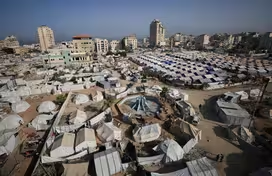
‘Four Mothers’ shares worldwide experiences of parenthood
Clip: 5/11/2025 | 5m 32sVideo has Closed Captions
New book ‘Four Mothers’ explores the first year of parenthood around the world
This Mother’s Day, we explore how government policies and society’s expectations shape the experience of new moms. Ali Rogin speaks with journalist Abigail Leonard, whose new book “Four Mothers” follows the ups and downs of the first year of motherhood around the world.
Problems playing video? | Closed Captioning Feedback
Problems playing video? | Closed Captioning Feedback
Major corporate funding for the PBS News Hour is provided by BDO, BNSF, Consumer Cellular, American Cruise Lines, and Raymond James. Funding for the PBS NewsHour Weekend is provided by...

‘Four Mothers’ shares worldwide experiences of parenthood
Clip: 5/11/2025 | 5m 32sVideo has Closed Captions
This Mother’s Day, we explore how government policies and society’s expectations shape the experience of new moms. Ali Rogin speaks with journalist Abigail Leonard, whose new book “Four Mothers” follows the ups and downs of the first year of motherhood around the world.
Problems playing video? | Closed Captioning Feedback
How to Watch PBS News Hour
PBS News Hour is available to stream on pbs.org and the free PBS App, available on iPhone, Apple TV, Android TV, Android smartphones, Amazon Fire TV, Amazon Fire Tablet, Roku, Samsung Smart TV, and Vizio.
Providing Support for PBS.org
Learn Moreabout PBS online sponsorshipLAURA BARRON-LOPEZ: Finally tonight on this Mother's Day, we explore how government policies and society's expectations shape the experience of new moms.
Ali Rogin spoke with journalist Abigail Leonard, whose new book, "Four Mothers" follows the ups and downs of the first year of motherhood around the world.
ALI ROGIN: Abigail Leonard, thank you so much for joining us.
ABIGAIL LEONARD, Author, "Four Mothers": Thank you so much for having me.
ALI ROGIN: You yourself became a mom while you were living overseas in Japan.
And in this book you profile women, mothers from there, from Finland, Kenya and the United States.
What inspired you to write this book?
ABIGAIL LEONARD: So I moved to Japan when I was six months pregnant, which in retrospect was sort of a bold move.
So I was sort of navigating all the challenges of early motherhood and also the challenges of sort of getting used to a new place, new culture and a new sort of approach to parenting than one that I had been raised with.
And then I came back to the U.S. after seven years.
I had two more kids in Japan.
And I sort of got to understand the American system of parenting and how it presented its own challenges.
And I just wanted to think about whether any countries sort of got this right, whether they supported mothers in an effective way and sort of what we could learn from them.
ALI ROGIN: And there are a lot of similarities among the experiences that these mothers describe as they're going through.
But there's also a lot of things that set each experience apart.
Can you tell us about some of those top line similarities and differences?
ABIGAIL LEONARD: I thought it was really fascinating to see how just in the first sort of few moments of being a mother, it hit them in sort of the same way.
I mean, the woman in Nairobi, Kenya, and the woman in Salt Lake City, Utah, said almost verbatim the same thing, which was, I can't believe I'm someone's mom now.
And so there was this sort of universality to the experience of becoming a mom.
And then that transition that sort of happened throughout the year of accepting that new role.
What was different was just sort of the systems that they existed in and how much support they received.
So, for example, paid leave, the women in the U.S. and Kenya got three months, although in Kenya it was fully paid, in the U.S. it wasn't.
And in Finland and Japan, they had almost a year and so they had a lot more time with their babies in that first year.
And it really sort of impacted, I think, the amount of stress that they felt.
They didn't have to think about going back to work, about pumping, even, like, breast pumps, all these things that American mothers sort of think about.
And then childcare, of course, was a major one.
I mean, you could see how much it affected women, whether or not they had access to affordable child care.
ALI ROGIN: One thing that I found interesting was how these women's experiences were shaped not just by concrete government policies, but also by more amorphous societal expectations.
And I wonder, what was that like kind of unraveling that in these stories?
ABIGAIL LEONARD: I think a big part of it was gender roles.
And you could really see it in the comparison of Japan and Finland, which both have really robust social safety nets and policies for families.
But in Japan, there's a much more gendered approach to parenting.
So, you know, the mothers there are basically expected to do all of it.
They don't use painkillers very much in birth.
And there's this idea that pain bonds the mother and child and that the woman is sort of supposed to sacrifice for her child.
And it was a completely different way of thinking about things in Finland, where the comfort of the mother was sort of a priority.
Even if you have all sorts of services like universal daycare or like paid maternity leave, if you don't have that sort of foundation of equality between the mother and father, it just puts an enormous burden on the mother.
ALI ROGIN: I don't want to make you wade into U.S. politics, but there has been a lot of conversation lately about how to boost a declining birth rate.
And I'm wondering, given your reporting in this book, what do you think the mothers would want to see if they were contemplating growing their family?
ABIGAIL LEONARD: It is interesting.
Japan already has this sort of cash bonus thing.
And I, even when I was there, received it.
And there was no way that was going to make me, you know, have more children than I was already planning to have or that I could sort of otherwise afford to have and take on paid leave is huge.
Flexible return to work is also a really big deal.
I mean, the woman in Japan was transferred to a different department.
When she came back, there was sort of no job stability.
She ended up thinking, I'm not going to be able to have any more children, and she quit her job because it was too much.
ALI ROGIN: One quote that really struck me in the story was in the context of the Kenyan mom, whose name is Chelsea, and there's a quote here from an expert who says, quote, you're learning so many things fresh, and as you do, you're learning about yourself.
So it allows you to articulate your life how you want.
And in that way, motherhood can heal some trauma.
How did you see that play out with Chelsea and the other moms?
ABIGAIL LEONARD: Yeah, I thought that was such a beautiful quote.
And she had a really tough time.
Her parents died right before she had her baby.
And there was a lot of sort of mourning and grief that went on with motherhood.
Just her relationship with her own baby sort of helped her navigate what were otherwise very challenging circumstances.
I saw that for all of them.
I saw it with the American woman as well.
I mean, American motherhood is very hard.
It was hard on her parents who were taking care of her infant child.
It was hard on her, you know, because she couldn't afford childcare.
And so having this relationship with her baby, I think really did get her through.
And so, you know, if nothing else, there is some amount of hope there.
ALI ROGIN: Abigail Leonard, the book is for mothers.
Thank you so much for joining us.
And happy Mother's Day.
ABIGAIL LEONARD: Thank you.
You, too.
‘Catastrophic’ conditions in Gaza under Israeli blockade
Video has Closed Captions
Clip: 5/11/2025 | 4m 23s | ‘Catastrophic’ conditions in Gaza as Israeli blockade enters third month, aid group says (4m 23s)
One woman’s mission to help save cheetahs from extinction
Video has Closed Captions
Clip: 5/11/2025 | 5m 30s | One woman’s mission to help save cheetahs from extinction (5m 30s)
Pope Leo XIV calls for peace and unity in Sunday address
Video has Closed Captions
Clip: 5/11/2025 | 5m 26s | Pope Leo XIV calls for peace in Gaza and Ukraine in his first Sunday address as pontiff (5m 26s)
Providing Support for PBS.org
Learn Moreabout PBS online sponsorship
- News and Public Affairs

FRONTLINE is investigative journalism that questions, explains and changes our world.

- News and Public Affairs

Amanpour and Company features conversations with leaders and decision makers.












Support for PBS provided by:
Major corporate funding for the PBS News Hour is provided by BDO, BNSF, Consumer Cellular, American Cruise Lines, and Raymond James. Funding for the PBS NewsHour Weekend is provided by...


